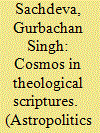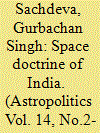|
|
|
Sort Order |
|
|
|
Items / Page
|
|
|
|
|
|
|
| Srl | Item |
| 1 |
ID:
162405


|
|
|
|
|
| Summary/Abstract |
The fact that there are abundant mineral resources in space is shown by remote sensing and observation through space probes and analysis of samples, in situ and otherwise. That these resources are useful to humanity and can augment depleting Earth resources is also established beyond a doubt. Further, the technology to excavate and process the same in situ is feasible. The end-product can be used for other activities on the mined planet or transported to Earth. The processed material can also be recycled for use and manufacturing on the celestial body itself, or to refuel space probes on deep space missions. Thus, the utility of celestial natural resources to mankind is obvious, but the algorithms of law and economics in regard to excavation, processing, transportation, and use in situ are not yet adequately clear for business viability and reasonable profits. This article discusses the prospects of space mining on celestial bodies in this context, focusing on the case of U.S. space laws.
|
|
|
|
|
|
|
|
|
|
|
|
|
|
|
|
| 2 |
ID:
116249


|
|
|
|
|
| Publication |
2012.
|
| Summary/Abstract |
Religions have conceptualized the cosmos, its Creator, and its origin. The major monotheistic religions of Judaism, Christianity, and Islam have philosophized on the creation of the Earth and man by a conscious act of God. The religions of the Orient-Hinduism and Sikhism-have a different visualization of the emergence of the universe and living beings on the Earth. This article provides a brief exposition and a comparative analysis of the scriptural differences in relation to the cosmos. In particular, the focus is on a comprehension expounded in Sikh scriptures with emphasis on the meaning therein for the Big Bang theory and exact time of creation, expanse of the universe, evolution of life, conservation of energy, and the end of the universe with cyclical repetition.
|
|
|
|
|
|
|
|
|
|
|
|
|
|
|
|
| 3 |
ID:
098142


|
|
|
|
|
| Publication |
2010.
|
| Summary/Abstract |
The space age is likely to be dominated by space commercial activities. As these activities develop, it is important to consider business values, commercial ethics, and trade discipline. The failure to do so could result in space commercial development on the basis of greed for profit and competitive advantage for advancement, as has taken place on Earth. To better prevent this possibility, this article proposes that there is the need to develop a "New Ethics for Space Commerce" based on high standards of business morality and commercial honesty, with moorings in conscious social responsibility and due regard to ecological sustainability.
|
|
|
|
|
|
|
|
|
|
|
|
|
|
|
|
| 4 |
ID:
166422


|
|
|
|
|
| Publication |
New Delhi, Pentagon Press, 2019.
|
| Description |
xxii, 231p.hbk
|
| Standard Number |
9789386618696
|
|
|
|
|
|
|
|
|
|
|
|
Copies: C:1/I:0,R:0,Q:0
Circulation
| Accession# | | | | | | | | | | | |
| 059673 | 387.8/SAC 059673 | Main | On Shelf | General | | | | | | | |
|
|
|
|
| 5 |
ID:
149789


|
|
|
|
|
| Summary/Abstract |
The tradition of promulgating military doctrines exists from time immemorial. In India, the same concept was adapted for civil purposes in the case of a nuclear doctrine. Herein, a space doctrine of India is proposed. From the beginning of space activities, India did not have an articulated, directive space policy. Nevertheless, India achieved successes in space activities ranging from indigenous launch to scientific probes to the Moon and Mars. Today, India is a space power of global standing and a space doctrine represents an authentic expression of India’s stance on space governance and space activities. The doctrine suggested in this article is one of resolve of the state to dedicate itself to a committed vision of collective prosperity through space activities, collective welfare of humankind, equity sharing with all stakeholders, and sustainability in the use of the space environment. It is an authoritative and emphatic statement on intended uses of outer space, an almanac of governing practices, and an enabler of regulation and supervision of national space activities in outer space.
|
|
|
|
|
|
|
|
|
|
|
|
|
|
|
|
|
|
|
|
|